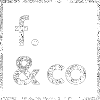17. Myths
There is this widely-circulated myth around creativity that in order to be creative, one has to create, out of nothing, something entirely new. There are very few documented occurences of such phenomenon. One is provided in the Ancient Testament, where a creature known as the Creator, creates, over a period of six days, the world that we live in today. Another similar narrative emerged from the world of science, as physicists theorized of a Big Bang that, out of nothing at all, would have created, in one grandiose explosion, all the matter (and energy) in the universe.
Another tough-skinned myth is that of the "creative" – not unlike the image of the Creator – as a lonely genius, living in isolation, churning out one amazing idea after the other. There have been, of course, a great number of thinkers, artists and businesspeople that can be counted as “self-made men” (and, more and more, women), but their genius could only be recognized if their creations also touched other people. Otherwise, they would only have been more trees falling in the forest.
All things were together; then came Mind and set them in order.
– Greek philosopher Anaxagoras. 499-428 BC.
Myths are fascinating. Out of deep human sentiments and existential questions, shared across cultures and generations, emerges a collective will to explain the world in a few broad strokes, to encapsulate meaning in a story that “travels well”. Like a stone is relentlessly polished by the tide, stories are passed down from generation to generation to slowly become more perfect: truths which we hold to be self-evident.
Myths, as stories told over and over until they become widely accepted, almost as fact – especially those about the creation of our universe and the foundations of our civilization – are the real feat of creativity. They are populated with archetypal protagonists, peculiar places, pivotal moments and powerful symbols. And they are a collective endeavour of continuous storytelling, reframing, re-interpreting – often spanning long stretches of space and time.
There is much more creativity going on in religion and physics than there is in the act of Creation or in the Big Bang they claim to describe. And it's generally an unplanned and de-centralized process. We could probably say the same thing about most of the iconic brands of our times. The "myth" is often times much more important to the brand than the product itself. What’s the myth of Apple, Disney, or Coca-Cola?
This text is part of a series written in the context of the Fifth edition of the Montreal-Barcelona Summer School on Management of Creativity, organized by Mosaic HEC Montréal and Universitat Barcelona, July 9 to 24, 2013.
Illustration by Studio 923a. Read all posts in the series at blog.fandco.ca/yulbcn.


